Made in Slovenia
If you enjoy gin then what better way to turn your habit into a hobby than to explore the world beyond the big names, and if you’d like a good excuse to restock your liquor shelf with intriguing bottles and varied tastes then consider entering the world of Slovenian gin
To the ill-informed this might seem like a risky proposal – what would Slovenians know about gin? But this would be a mistake akin to dismissing Japanese whisky or Californian wine. More so, perhaps, as Slovenia not only has the climate and knowledge needed to produce the drink, but a long history of working with juniper berries, producing a native spirit known as brinjevec (sometimes brinavec).
Brina is the Slovenian name for the berry that gives gin, along with various other botanicals – each producer using their own selection – its distinctive taste, and here we’ll note that botanicals, distillation and restorative liqueurs are also all part of the country’s cultural heritage. And gin, if not quite in the DNA, is certainly in the bloodstream of a growing number of Slovenians.
We thus present part one of a brief guide to of the bigger names in domestic gin production, the ones you might find in good liquor stores and bars across the country, and soon, perhaps, abroad.

Berryshka, based in Dolenjske Toplice, is family firm that started in 1950 producing essential oils. While this remains the core business, the company has long applied its expertise in extraction and distillation to other products, including a range of spirits and fruit liqueurs, with drinks that are low in sugar, come with no artificial colours or additives, and are made using natural spring water. These liqueurs are based on natural flavours such as cherry, aronia, walnut, blackcurrant, blackberry, blueberry, and juniper – the berry that gives gin its distinctive taste. Berryshka juniper products currently include a brinjevec – marketed as brandy and sold in both original and oak-barrel aged varieties – and two gins. London Gin Berryshka follows the traditions of the most popular gin, with a neutral alcohol flavoured with juniper berries, angelica, iris, cinnamon, liquorice, cardamom, anise, cumin, lemon, and coriander, while the while the more distinctive BrinGin Berryshka has the alcohol provided by juniper distillate, producing a drink that can be savoured neat, or enjoyed with the usual mixers. You can find Berryshka’s liquers and chocolates in many stores, but for the full experience you’re welcome to visit the factory, which also produces handmade chocolates, an experience that could easily be combined with a trip to Novo mesto, or the nearby hot springs. Find out more the company’s website.
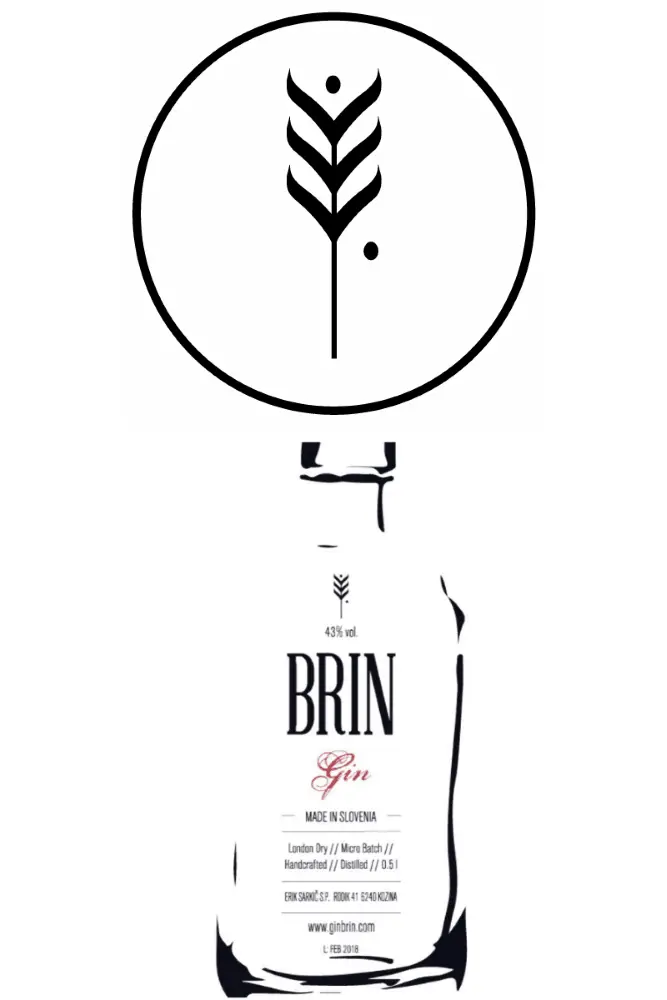
Brin Gin is the work of Erik Sarkič, a third-generation brinjevec producer who grew up with a deep background in junipers and distillation. The move to gin was thus natural one, opening up new markets for the family business, and arguably making better use of the berries, since a litre of brinjevec requires around 8 kg of them, while the same amount of gin gains it’s more subtle flavour from just 20 g. In his mission to dive deeper into the flavour profile of the juniper Berry Erik is supported by Matevž Kmet, a biochemist who works as a consultant for the firm and has the air of a mad scientist, or at least a man for whom the greater the challenge, the more exciting it is to consider. Together Erik and Matevž dream up new products and then work to make their dreams become reality. One of these, still in the experimental stage, includes an alcohol-free gin, for those who love the taste of a good G&T but want to maintain a clear head. Another is what’s intended to be the world’s best, and most expensive, gin – with production of this now completed, and the launch only waiting on the perfect bottle to be found. Finally, Erik and Matevž are also working on a product that will be made entirely of juniper, including a juniper wood bottle. You can keep up with the latest developments, and order a bottle online, here.
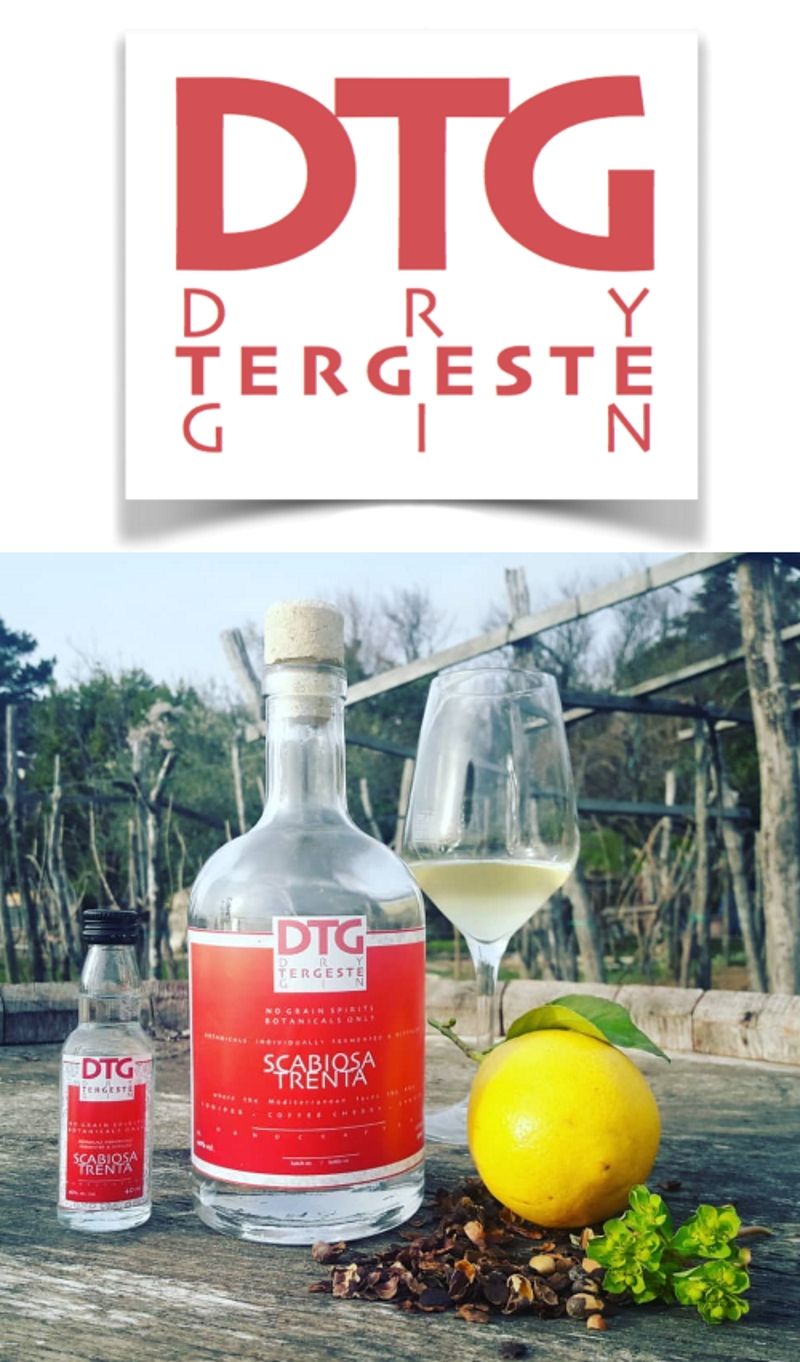
DTG (Dry Tergeste Gin) also takes its own approach to the classic spirit, and is yet another small producer showing that the Slovenian tradition of brinjevec means the country is well positioned to become home to a variety of boutique gin brands, all of which are worthy of a place on your shelf. The name refers to Tergeste, or Trst (or, you must, Trieste), and Martin Žužek Kres, an anthropologist by training who developed the drink, wants his products to reflect the history of the land. However, DTG doesn’t just have a story to tell, but also a product that distinguishes itself from other gins in a number of ways. For one, it avoids the use of grain alcohol to give the drink its kick, and instead relies on alcohol produced from the juniper berry, mixed with a unique coffee cherry brandy. Coffee cherries are the fruit that grow around and protect coffee beans, and contain both caffeine and antioxidants. Their use in gin doesn’t produce a coffee-flavoured drink, but does give an interesting taste that can be enjoyed neat, without ice, or with mixers. In a sign of how quickly the Slovenian gin scene is set to evolve, the company has three new products that are still in development, but which I was lucky enough to taste at a recent event, and these will add to the flagship drink’s flavour profile with the use of spruce, thyme, and wild mint. Look out for DTG in stores, or order a bottle online.
All the parts of this series can be found here
May 8, 2019
You might know of Klemen Slakonja from his international hit Putin Putout that rocked YouTube in 2016, and with 23 million views is perhaps the most successful Slovenian video on the platform to date.
Slakonja, originally from Brežice, started his impersonating career somewhere in high school, then studied at the Academy for Theatre Radio Film and Television, and fooled around on the local Radio Energy in Krško. In the late summer of 2007, he performed at the welcoming ceremony for a hammer thrower, Primož Kozmos, who was returning silver from the World Championship in Osaka. There, Slakonja was spotted by a national radio journalist, who notified Sašo Hribar, the main host of the popular Radio Ga-Ga Show, of the young talent.
Slakonja accepted the invitation and performed on the show several times side-by-side with the current Slovenian prime minister, Marjan Šarec. Below is an excerpt from his first appearance. The plot of this show was the funeral of Angela (one of the show's recurring characters):
In 2008 he landed his first job as a TV host, in a popular family Sunday afternoon show called NLP on RTV 1. In 2011 he hosted his first EMA show, which chooses the Slovenian entry for the Eurovision Song Contest, and did so again in 2012 and 2016.
From 2013 to 2014 he hosted two of his own comedy shows for commercial TV stations, namely Zadetek v petek (Full on Friday) and Je bella cesta (Damn). Below is an example from one of these shows, in which he is impersonating Modrijani, a Slovenian oompah band, while the song talks about the uptight, obscenity free culture of the Slovenes, in which everyday words hint at sexuality.
2016 was the year of a big international breakthrough for Klemen Slakonja, when his Putin Putout YouTube video went viral, which was followed by much-viewed parodies featuring Angela Merkel and Donald Trump.
Also in 2016, Klemen Slakonja played himself as an aspiring serious actor turned popular entertainer due to public demand in a play Ubu the King, directed by Jernej Lorenci and produced by Slovenian National Theatre Drama.
Although Klemen obviously needs some rest, we hoped he would at least appear during the Eurovision Song Contest later this month, announcing Slovenia’s “points” to Tel Aviv and perhaps cracking a joke or two while doing so. After all, he managed to post a rather raw but funny parody of this year’s Slovenian entry “Sebi” on his Facebook in March. The job went to Lea Sirk instead, who might not be able to hide her disappointment if Zala Kralj & Gašper Šantl win.
You can see all of Klemen’s videos on his YouTube channel, here.
STA, 6 May 2019 - A team that also featured five Slovenian researchers has published a ground-breaking cell differentiation paper that can potentially help revolutionise personalised regenerative medicine, Slovenia's Jožef Stefan Institute (IJS) has reported.
Contributing to the paper, published in the journal Molecular Cell, were London-based researchers Miha Modic and Jernej Ule, Gregor Rot of the University of Zurich, Tjaša Lepko from the Helmholtz Centre in Munich and Boris Roglej of IJS.
The researchers described the regulatory network explaining the starting events leading to an effective differentiation of stem cells and the development of an embryo. The findings are considered groundbreaking for the understanding of cell differentiation processes.
The researchers were examining the molecular mechanism of the differentiation of pluripotent cells, which differ from adult stem cells in that they are capable of differentiation into any cell of the human body.
Induced pluripotent cells can then reprogramme any cell of a person's body into induced stem cells. These can in turn be differentiated into all cell types, for instance also the patient's own beta cells that produce insulin, meaning they have the potential to revolutionise personalised regenerative medicine.
A complex series of studies allowed the researchers to discover in what way paraspeckles, irregularly shaped compartments of the cell that do not exist in the nuclei of pluripotent cells, are formed during the differentiation of stem cells and what role is played by RNA (Ribonucleic acid)-networks and RNA-binding proteins.
According to IJS, paraspeckles are the new "rising stars" in the field of cellular biology that can potentially help explain a number of conditions in the human body but are poorly researched.
Along with the utility for regenerative drugs, the understanding of these regulatory networks could also shed new light on various conditions, including cancer and neurodegenerative diseases.
The paper, titled Cross-Regulation between TDP-43 and Paraspeckles Promotes Pluripotency-Differentiation Transition, can be read here (PDF).
A total of 77 teams competed in the 2018-2019 Textron Aviation/Raytheon Missile Systems/AIAA Foundation Student Design/Build/Fly (DBF) Competition, held April 11-14, at the Tucson International Modelplex Park Association (TIMPA) Airfield, Tucson, Arizona. Fifty-six teams were from within the United States, while 21 came from abroad, including the winning team – from the University of Ljubljana. In second place was the ream from Georgia Tech, while third place was taken by Austria's FH Joanneum of Applied Sciences.
The team of 17 students from the Faculty of Mechanical Engineering took part in it under the mentorship of Dr. Viktor Šajn, and was led by the engineering student Timotej Hofbauer. The group chose to build the aircraft entirely from composites with the help from sponsors Pipistrel, Akrapovič, and Zavod404.
Speaking about the project, and quoted on the University’s website, Hofbauer said: “We have been building the aircraft for more than half a year and committed more than 2000 hours of work to it. We succeeded in building an incredibly fast and light composite aircraft that can reach speeds of over 100 km/h and is capable of flying at the competitive speed for more than 10 minutes. The aircraft, ready to fly, weighs approximately 9 kg, of which 35 % constitute the batteries alone. It can carry 18 “bombs” and has a wing span of 2.5 meters.”
As noted in the related press release from the American Institute of Aeronautics and Astronautics (AIAA) Foundation, “the DBF competition encourages and recognises excellence in aerospace engineering skills at the undergraduate and graduate levels by challenging teams to design and fabricate a radio-controlled aircraft conforming to strict guidelines, submit a written report about the aircraft's design, and fly their aircraft over a defined course while carrying a payload and landing it without damage. This year, the design simulated a multi-purpose aircraft to support carrier operations.”
More photos from this year’s event can be seen here, while the following video (from 2018) gives a flavour of the event.
STA, 5 April 2019 - The University of Maribor and the company SAB-LS signed a contract in Maribor on Friday, April 5, on the launch of the first Slovenian nanosatellite into orbit. Trisat is to fly into space on a light European Vega rocket that is to be launched from French Guiana in August.
Trisat has been developed at the Maribor Faculty of Electrical Engineering and Computer Science in cooperation with the Slovenian company Skylabs.
According to the chancellor of the Maribor university, Zdravko Kačič, the launch of the nanosatellite will be an important step in the internationalisation of the Slovenian space industry and a recognition for its technology.
"It is a proof that a student project can develop into an important project for the Slovenian industry and environment," he said.
"Nanosatellites are an important segment in the present-day space industry, because they can bring new technology into space in a cost-efficient and quick way. The new technology can thus be evaluated much quicker and cheaper, which reduces financial risks in this field," he said.
Trisat, weighing only 4.4 kilos, is capable of taking multispectral images of Earth in short-wave infrared spectrum with a camera unlike any other in space at the moment.
It will be deployed at the altitude of 500 kilometres in a Sun-synchronous orbit by the Vega rocket launched by Arianespace, a company developing launch solutions for the European Space Agency (ESA).
The rocket will carry some 50 satellites, including another Slovenian satellite that is larger than Trisat, called Nemo HD, which has been developed by Vesolje-SI, the Slovenian centre of excellence for space sciences and technologies.
The company SAB-LS will act as Arianespace's subcontractor for deploying nanosatellites as part of the ESA's programme Small Spacecraft Mission Service.
The signing of the contract, on Aptril 5, was also attended by Economic Development and Technology Minister Zdravko Počivalšek, who said the move set the course for the development of Slovenian technology and proved that Slovenia was an important partner in space technology and thus also of the ESA.
Slovenia became an associate member of the ESA at the end of 2016.
The head of the Trisat project, Iztok Kramberger, stressed that Trisat, whose lifespan has been estimated at six years, was almost entirely a product of Slovenian know-how. It has been developed and manufactured in Slovenia, except for the solar panels, he noted.
You can learn more about the project here
STA, 5 April 2019 - Physicist Jure Žalohar has combined a number of seismic studies to come up with a new way to potentially predict earthquakes in the future. His theory suggests earthquakes are not coincidental but are caused by synchronised processes in the Earth's crust.
Žalohar's theory was introduced in his book The Omega-Theory: A New Physics of Earthquakes, which was released in May 2018.
It is based on a number of studies conducted by seismology, geophysics, and maths experts in the past two decades and could prove effective if put into practice through an IT system.
Seismology or the study of earthquakes tried to forecast earthquakes in the 20th century by taking into account various precursors, such as animal behaviour, regional transformations of topography, changes in the speed of primary and secondary seismic waves, or radon gas emissions.
These efforts were only partially successful, with many studies focusing on possible causes for earthquakes, but none of them coming up with the exact way of predicting them.
In 1997, journal Science published an article saying that earthquakes could not be forecast. The bold claim did not discourage scientists from continuing their research.
They succeeded in developing two theories; the theory of the Earth's tectonic plate movement and the theory of the epicentre mechanism. The majority of earthquakes occur at or near the boundaries between tectonic plates.
Žalohar's Omega theory, which could be described as a rotation theory of earthquakes, is based on the already established phenomenon of the plates' splits tending to be parallel and intersecting.
According to Žalohar, the plates are "enormous omega cells", experiencing earthquake sequences stemming from parallel splits, with the famous golden ratio determining the number of those splits. Earthquakes are thus connected between themselves and affected by the Earth's rotation.
The Omega theory suggests that earth tremors are not coincidental but a result of "highly synchronised processes" in the Earth's crust, which indicates they could be predicted.
The software programme T-Tecto was created on the basis of the theory, currently providing only one model of earthquake forecasting which includes a 64-day prediction.
An IT centre that could build on that and further develop the method would require additional funding and special training for monitoring personnel, said Žalohar.
The ability to forecast earthquakes would also entail potential ethical issues in case it was not confined to authorised organisations.
All our stories about earthwuakes and Slovenia can be found here
Regular readers of Mladina, the left-leaning review whose editorials we summarise each weekend (along with those of the right-leaning Demokracija, and – on occasion – Reporter) may have noticed the arresting advertisements that appear on page 3, and yet which don’t seem to promote any company or product.
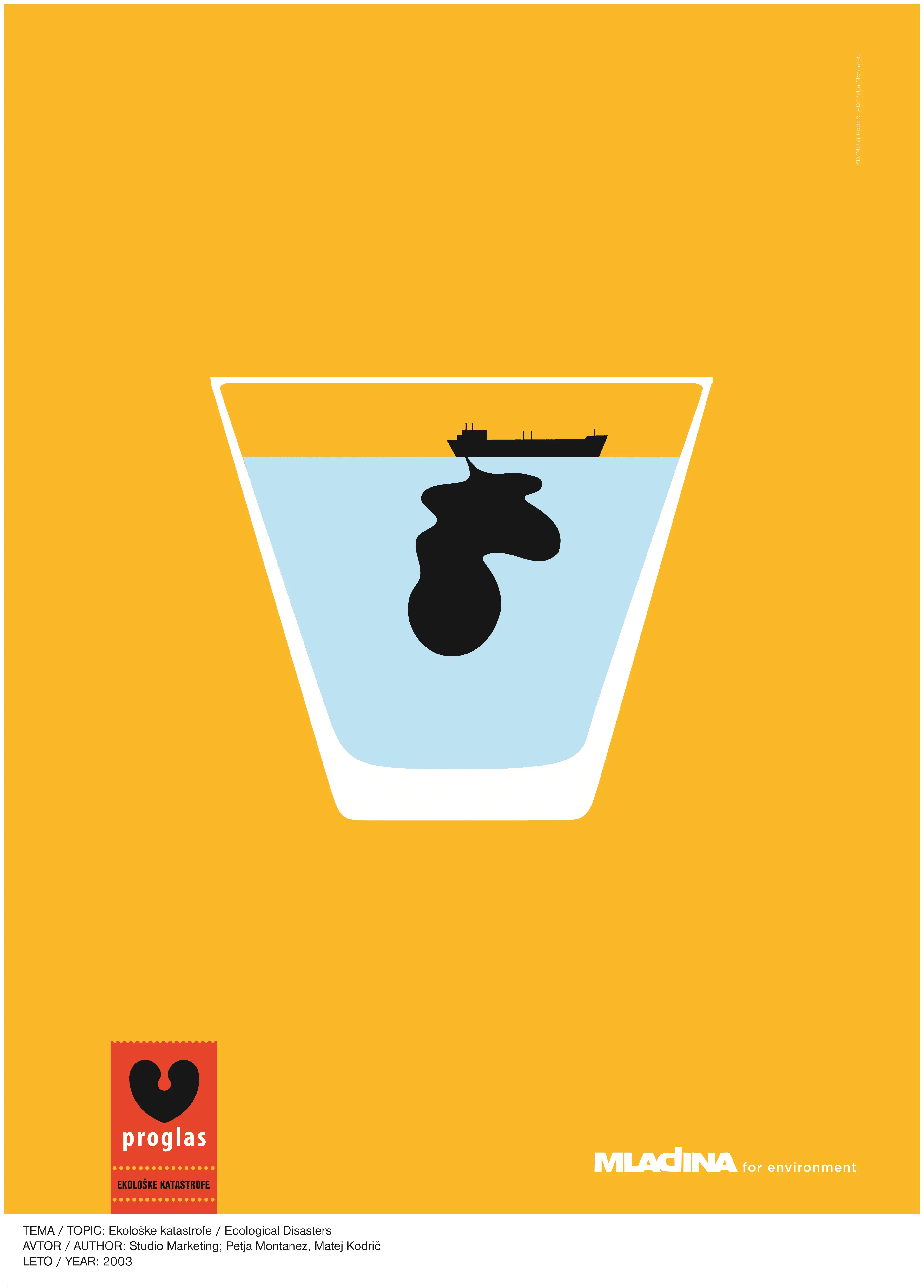
Theme Ecological Disasters. Author: Studio Marketing; Petja Montanez, Matej Kodrič
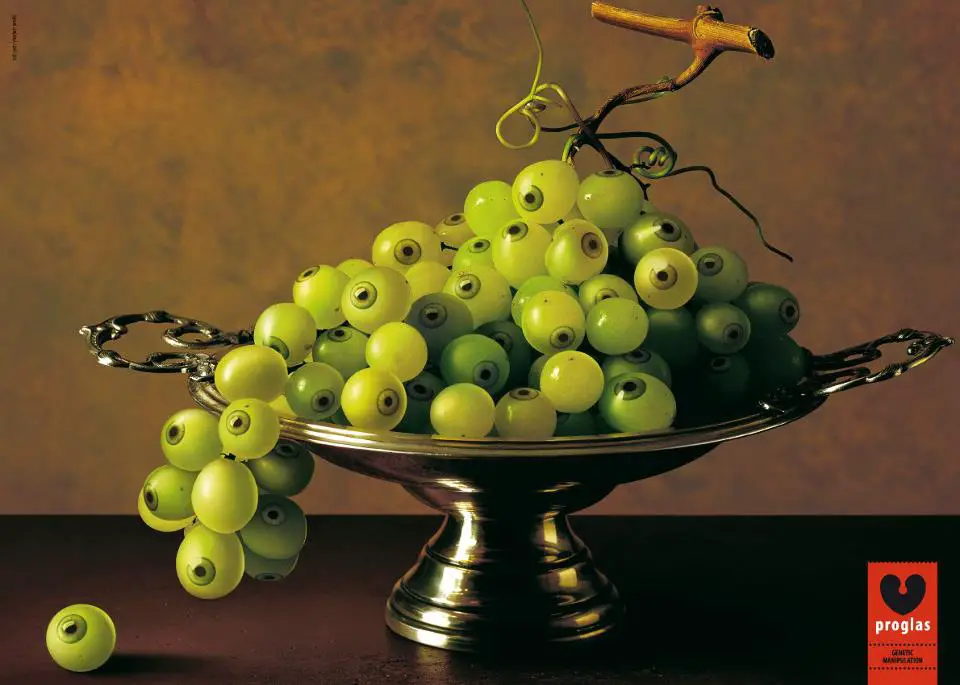
Theme: Genetic engineering. Author: Studio 360, Agencija Tovarna vizij, Vladan Srdić, Dragan Arrigler
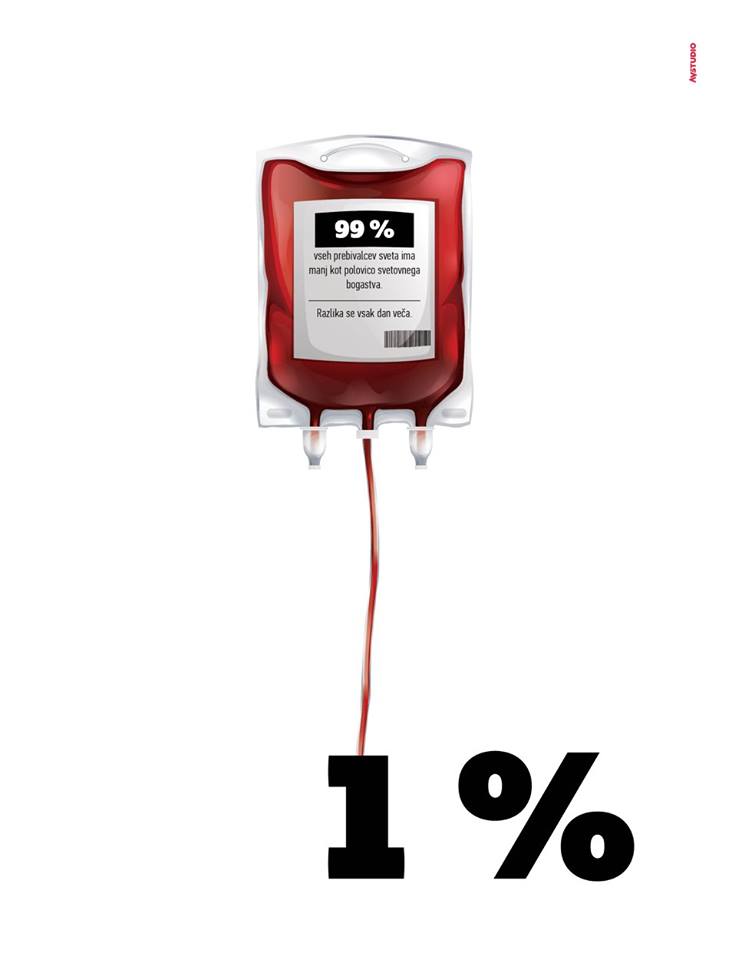
Theme: Greed. Author: AV Studio
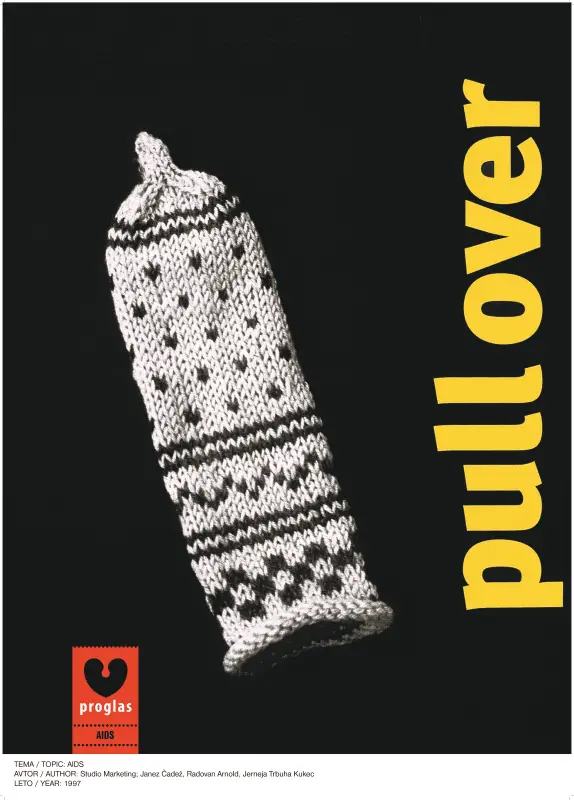
Theme: AIDS. Author: Studio Marketing; Janez Čadež, Radovan Arnold, Jerneja Trbuha Kukec

Theme: Greed. Author: SOZD
The page, known as Proglas and edited by Viva Videnovic for almost two decades, has been a feature of the magazine since 1997. It was introduced to provide a platform for Slovenian creatives to use the tools of their trade to engage in social commentary, enabling them to demonstrate their ingenuity and wit to a degree that’s not always possible with regular advertising.
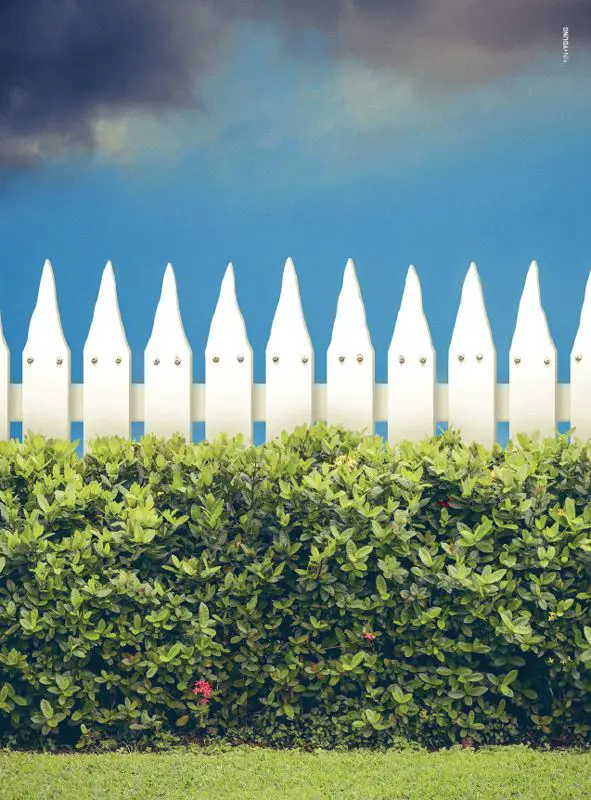
Theme: Extremism. Author: Yin + Young
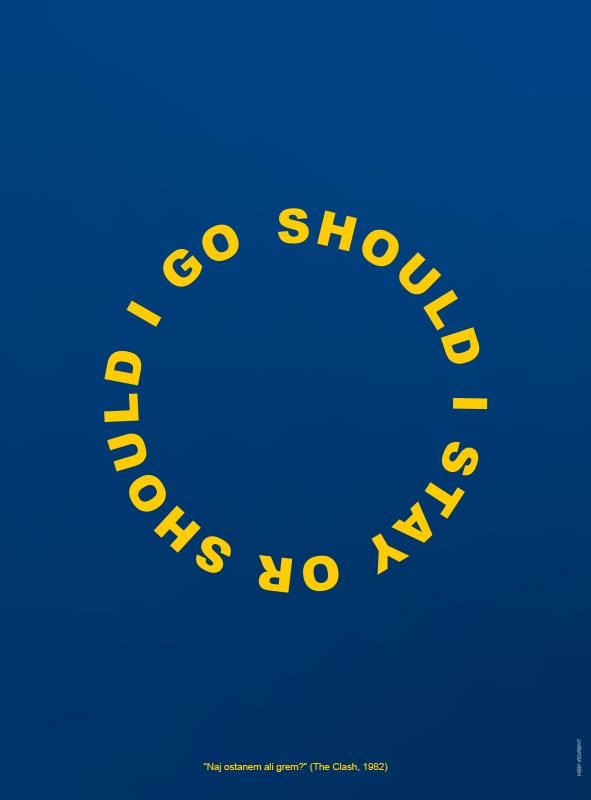
Theme: EU. Author: New Moment Ljubljana
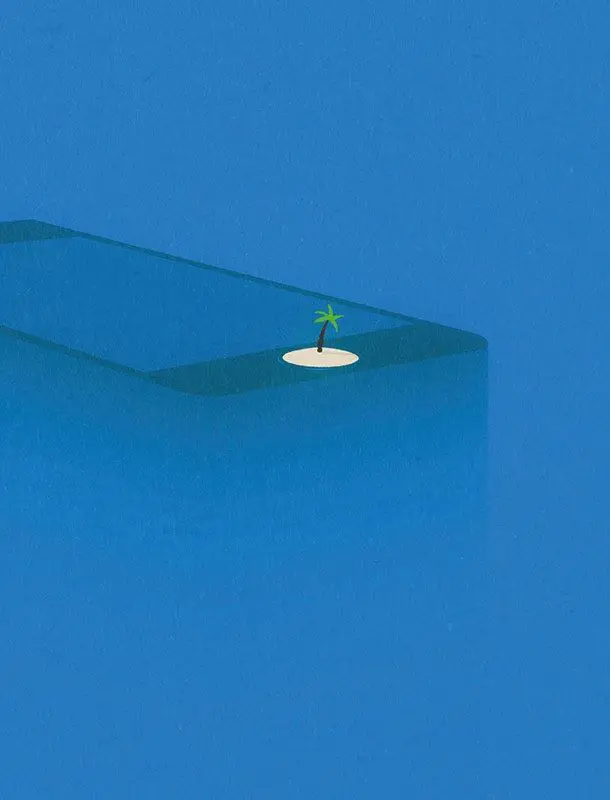
Theme: Loneliness. Author: Pristop

Theme: Child abuse. Author: Mediamix; Toni Tomašek, Miha Bevc, Aleksandar Jordačevič
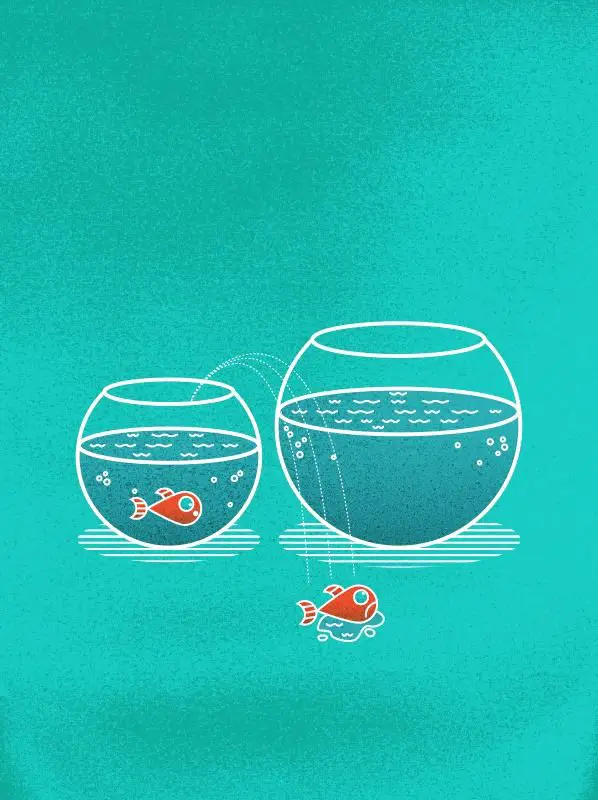
Theme: Success. Author: Yin + Young
In exchange for working pro bono, Mladina gives the contributors total freedom to create whatever they want, as long as it addresses that month’s theme. These have included all the pressing or passing social issues of the day, such as AIDS, mental health, over-consumption, social media, feminism, genetic engineering, economic imperialism, ecological catastrophes, fascism, tourism, sexual harassment, the precariat and so on.
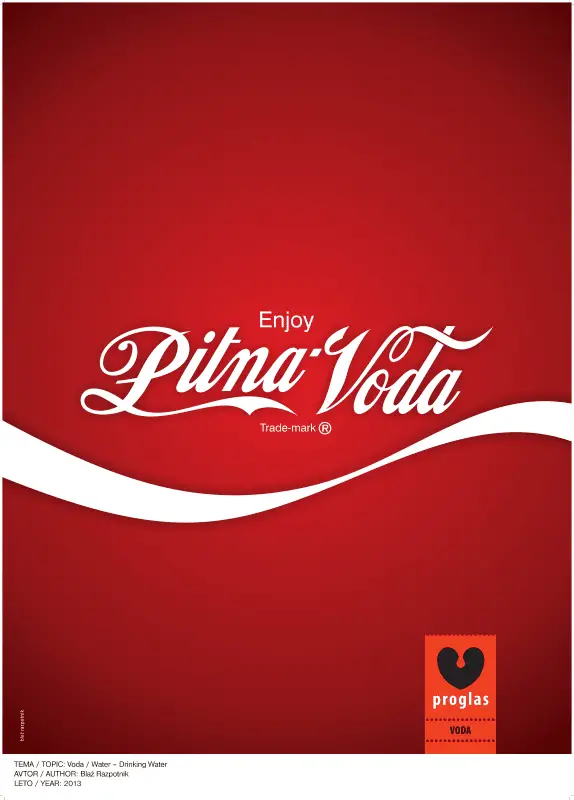
"Enjoy drinking water" Theme: Water. Author: Blaž Razpotnik
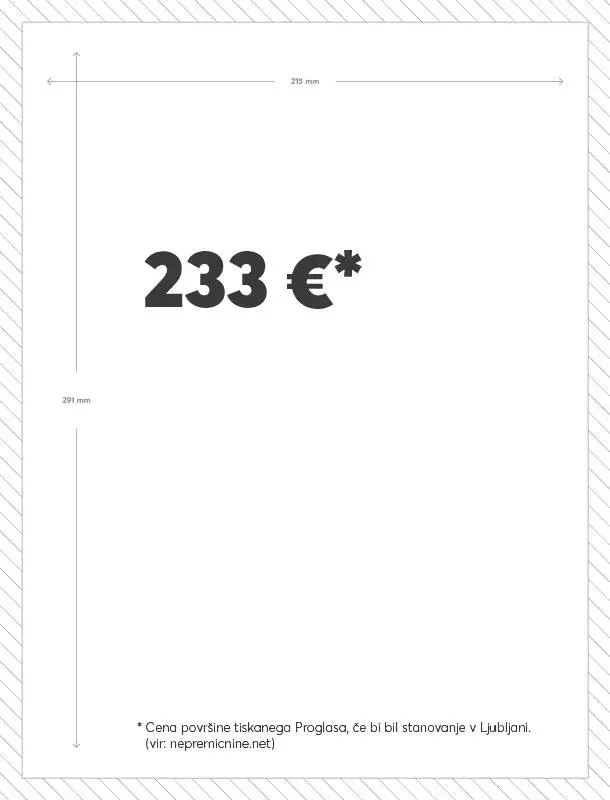
(How much a space the size of a page of Mladina - 291mm x 215mmwould cost in Ljubljana). Theme: Apartments. Author: Pristop
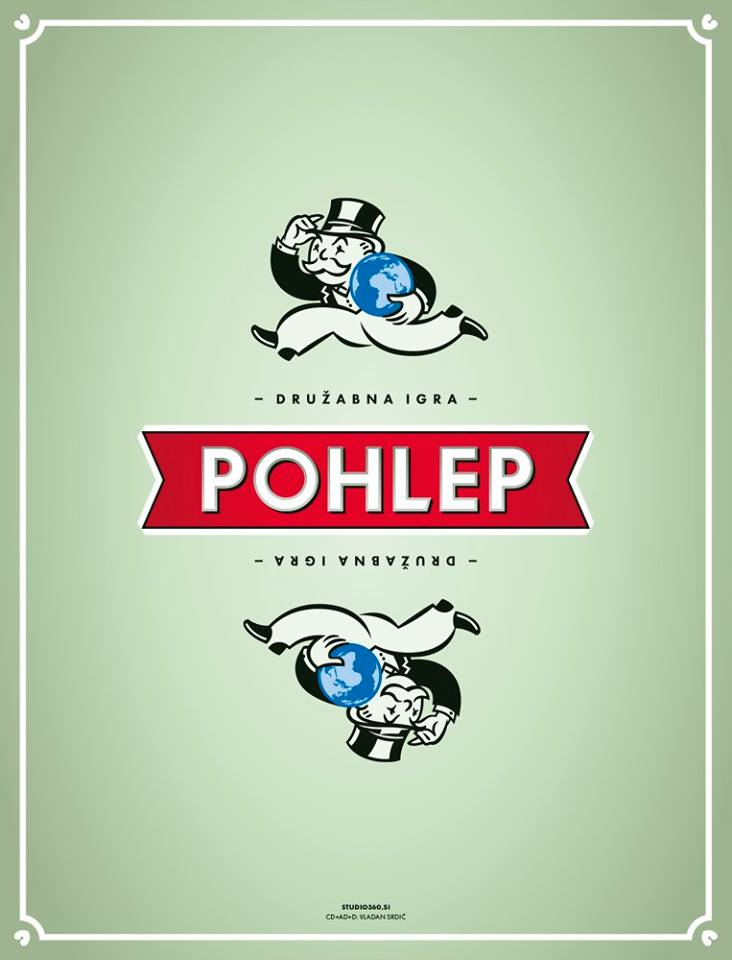
Theme: Greed. Author: Studio 360, VladanSrdić
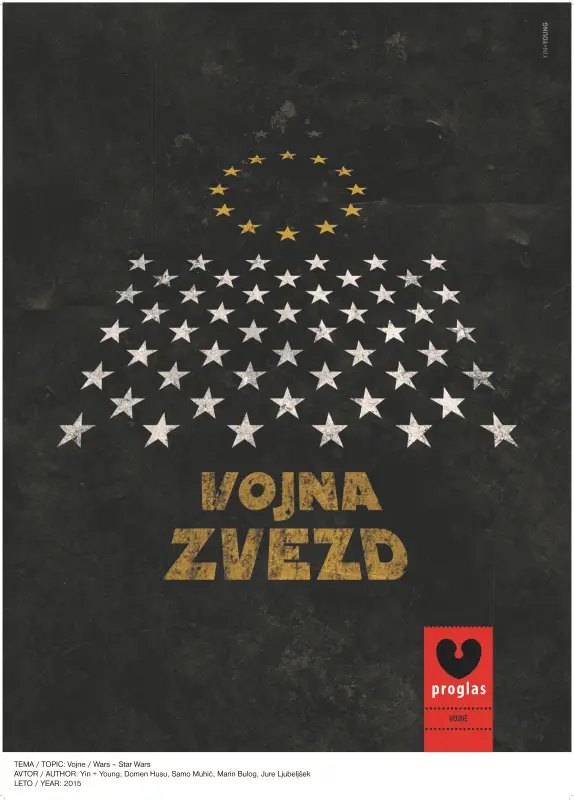
"Star Wars" Theme: War. Author: Yin + Young, Domen Husu, Samo Muhič, Marin Bulog, Jure Ljubeljšek
What you see in this story are thus just a few of the more than 1,000 works that have been published over the years. If you’d like to see more of Proglas, and what the Slovenian advertising industry is capable of when allowed to do what it wants, then follow the related page on Facebook, or see the whole archive on Mladina.
STA, 30 March 2019 - The University of Maribor (Univerza v Mariboru) will launch a centre for smart cities and communities, a platform linking researchers, the corporate sector and local communities who strive to develop and adopt high-tech solutions for more effective urban management and thus higher quality of life.
"University's fragmented knowledge about urban issues will be integrated and given new content," explained the university's representatives.
They believe that the new platform could also assist city administrations and companies which are developing smart city devices and services, pushing the university to the forefront of the future sustainable development of cities, especially in east Slovenia.
Stressing that smart urban management has become a societal challenge already acknowledged by many developed cities, the university pointed out that the smart city concept included all key aspects of managing a city.
These include security, transport management, logistics, sustainable spatial planning, water and energy supply, post-office services, waste management and local food supply.
STA, 22 March 2019 - Slovenia's top science and research institution, the Jožef Stefan Institute (IJS), will mark its 70th anniversary over the course of the coming week, having started with an open day last Saturday, March 23. Between Monday and Friday, top researchers from across the globe will speak in Ljubljana about their work at the cutting edge of science.
Perhaps the top event of the coming week will be a talk by top robotics expert Vilay Kumar, the dean of Penn Engineering, a graduate school at the University of Pennsylvania.
Taking place as part of the main ceremony marking the IJS's 70th anniversary on Wednesday, Kumar's talk about flying robots will be "very interesting visually," IJS head Jadran Lenarčič has told the STA.
The anniversary week will start with an open day tomorrow, allowing the public to take one of several tours of the institute's laboratories.
On Monday, a day after the actual birthday of the late Jožef Stefan (1835-1893), considered one of the top Slovenian scientists, the 27th annual Jožef Stefan Days will officially open.
Zdenka Badovinac, the director of Modern Galerija, will deliver a talk ahead of the opening of an exhibition titled Irwin: NSK Guards and Processions.
The next day, Bart De Moor of KU Leuven will talk about the role of new technologies and data science in biology in the future, while Rosario Rizzuto, a rector at the University of Padua, will talk about calcium signalling in cells.
After the main ceremony on Wednesday, Thursday will feature a talk by Jean-Claude André, the inventor of 3D printing, while the Jožef Stefan Days will wrap up with a talk by Geoff Webb of Monash University, a top data scientist.
The institute will also name the winner of an annual competition for young researchers. This year, the winner will get between EUR 300,000 and 350,000 to set up their own lab.
Yo ucan see more details of the programme here, while all our stories on research in Slovenia are here
March 21, 1949, is the birthdate of the man who – until the arrival of Melania Trump – was arguably the most famous living Slovene, the “rock star philosopher” and Ljubljana-native Slavoj Žižek, who can still be seen walking the streets of the city when not holed up in his apartment writing or travelling to one of his many lectures, debates, interviews or other public appearances around the world. So in honour of the 70th birthday of man who’s done so much to put his hometown and country on the international intellectual map, we present 70 quotes on various topics and in no particular order to make you think, smile, frown or throw your electronic device across the room in frustration. Vse najboljše, Mr Žižek, and for the rest of you – enjoy your symptoms!
- Without the communist oppression, I am absolutely sure I would now be a local stupid professor of philosophy in Ljubljana.
- I do all my work to escape myself. I don't believe in looking into yourself. If you do this, you just discover a lot of shit. I think what we should do is throw ourselves out of ourselves. The truth is not deep in ourselves. The truth is outside.
- We Slovenians are even better misers than you Scottish. You know how Scotland began? One of us Slovenians was spending too much money, so we put him on a boat and he landed in Scotland.
- Here is an old phrase I like: 'The only way to the universal good is that we all become strangers to ourselves.' You imagine looking at yourself with a foreign gaze, through foreign eyes. I think this is something that could be the greatest thing in humanity. You are never really limited just to your own perspective. I don’t like the false identity politics of multiculturalism which says that you are enclosed in your culture. No, we have all this amazing capacity to be surprised, not by others, but by ourselves seeing how what we are doing is strange.
- The fact that a cloud from a minor volcanic eruption in Iceland—a small disturbance in the complex mechanism of life on the Earth—can bring to a standstill the aerial traffic over an entire continent is a reminder of how, with all its power to transform nature, humankind remains just another species on the planet Earth. The socioeconomic impact of such a minor outburst is due to our technological development (air travel)—a century ago, such an eruption would have passed unnoticed. Technological development makes us more independent from nature. At the same time, at a different level, it makes us more dependent on nature’s whims.
- When we are shown scenes of starving children in Africa, with a call for us to do something to help them, the underlying ideological message is something like: Don't think, don't politicize, forget about the true causes of their poverty, just act, contribute money, so that you will not have to think!
- What characterizes a really great thinker is that they misrecognize the basic dimension of their own breakthrough.
- European civilisation finds it easier to tolerate different ways of life precisely on account of what its critics usually denounce as its weakness and failure, namely the alienation of social life. One of the things alienation means is that distance is woven into the very social texture of everyday life. Even if I live side by side with others, in my normal state I ignore them. I am allowed not to get too close to others. I move in a social space where I interact with others obeying certain external ‘mechanical’ rules, without sharing their inner world. Perhaps the lesson to be learned is that sometimes a dose of alienation is indispensable for peaceful coexistence. Sometimes alienation is not a problem but a solution.
- The pressure ‘to do something’ here is like the superstitious compulsion to make some gesture when we are observing a process over which we have no real influence. Are not our acts often such gestures? The old saying ‘Don't just talk, do something!’ is one of the most stupid things one can say, even measured by the low standards of common sense. Perhaps, rather, the problem lately has been that we have been doing too much, such as intervening in nature, destroying the environment, and so forth... Perhaps it is time to step back, think and say the right thing. True, we often talk about something instead of doing it; but sometimes we also do things in order to avoid talking and thinking about them. Such as throwing $700 billion at a problem [the 2008 financial crisis] instead of reflecting on how it arose in the first place.
- The problem for us is not are our desires satisfied or not. The problem is how do we know what we desire.
- For Lacan, language is a gift as dangerous to humanity as the horse was to the Trojans: it offers itself to our use free of charge, but once we accept it, it colonizes us.
- I did teach a class here [at the University of Cincinnati] and all of the grading was pure bluff...I even told students at the New School for example… if you don’t give me any of your shitty papers, you get an A. If you give me a paper I may read it and not like it and you can get a lower grade. [He received no papers that semester]
- My eternal fear is that if, for a brief moment, I stopped talking... you know, the whole spectacular appearance would disintegrate; people would think there is nobody and nothing there. This is my fear, as if I am nothing who pretends all the time to be somebody and has to be hyperactive all the time... just to fascinate people enough so that they don't notice that there is nothing.
- Beyond the fiction of reality, there is the reality of the fiction.
- The experience that we have of our lives from within, the story we tell ourselves about ourselves in order to account for what we are doing, is fundamentally a lie – the truth lies outside, in what we do.
- It's not the same thing: coffee without cream or coffee without milk. What you don't get is part of the identity of what you get.
- I think that the task of philosophy is not to provide answers, but to show how the way we perceive a problem can be itself part of a problem.
- [T]his readiness to assume the guilt for the threats to our environment is deceptively reassuring: We like to be guilty since, if we are guilty, it all depends on us. We pull the strings of the catastrophe, so we can also save ourselves simply by changing our lives. What is really hard for us (at least in the West) to accept is that we are reduced to the role of a passive observer who sits and watches what our fate will be. To avoid this impotence, we engage in frantic, obsessive activities. We recycle old paper, we buy organic food, we install long-lasting light bulbs—whatever—just so we can be sure that we are doing something. We make our individual contribution like the soccer fan who supports his team in front of a TV screen at home, shouting and jumping from his seat, in the belief that this will somehow influence the game's outcome.
- True love is precisely the […] move of forsaking the promise of Eternity itself for an imperfect individual.
- [There is an] old joke about the difference between Soviet-style bureaucratic Socialism and Yugoslav self-management Socialism: in Russia, members of the nomenklatura drive themselves in expensive limousines, while in Yugoslavia, ordinary people themselves ride in limousines through their representatives.
- We live in weird times in which we are compelled to behave as if we are free, so that the unsayable is not our freedom but the very fact of our servitude.
- Populism is ultimately sustained by the frustrated exasperation of ordinary people, by the cry I don't know what's going on, but I've just had enough of it! It cannot go on! It must stop!
- The only choice is that between direct or indirect relations of domination and exploitation, with any alternative dismissed as utopian.
- We don't really want to get what we think that we want. I am married to a wife and relationship with her are cold and I have a mistress. And all the time I dream oh my god if my wife were to disappear - I'm not a murderer but let us say- that it will open up a new life with the mistress. Then, for some reason, the wife goes away, you lose the mistress. You thought this is all I want, when you have it there, you turn out it was a much more complex situation. It was not to live with the mistress, but to keep her as a distance as on object of desire about which you dream. This is not an excessive example, I claim this is how things function. We don't really want what we think we desire
- I have no physical fitness whatsoever. I don’t like sport. In my country skiing is popular. I find it nonsense. You climb a mountain and you slide down. Why not stay at the bottom and read a good book?
- What if eternity is a sterile, impotent, lifeless domain of pure potentialities, which, in order fully to actualise itself, has to pass through temporal existence?
- Yeah, because I'm extremely romantic here. You know what is my fear? This postmodern, permissive, pragmatic etiquette towards sex. It's horrible. They claim sex is healthy; it's good for the heart, for blood circulation, it relaxes you. They even go into how kissing is also good because it develops the muscles here – this is horrible, my God! It's no longer that absolute passion. I like this idea of sex as part of love, you know: 'I'm ready to sell my mother into slavery just to fuck you for ever.' There is something nice, transcendent, about it. I remain incurably romantic.
- I have become more aggressive over time. Some say I am more right wing, which I am absolutely not. On the refugee crisis, we should drop the patronising “They are warm people.” No, there are murderers among them in the same way there are among us. The liberal left prohibit writing anything bad about refugees, which results in the anti-immigrant right monopolising.
- I’m unable to have one-night stands. In my city, Ljubljana, you can tell exactly which women I’ve slept with, because I married them.
- We’re not dreamers. We’re awaking from a dream turning into a nightmare. We’re not destroying anything. We’re watching the system destroy itself.
- There is an old story about a worker suspected of stealing: every evening, as he leaves the factory, the wheelbarrow he rolls in front of him is carefully inspected. The guards can find nothing. It is always empty. Finally, the penny drops: what the worker is stealing are the wheelbarrows themselves...
- I am a good Hegelian. If you have a good theory, forget about the reality.
- Love is what makes sex more than masturbation. If there is no love even if you are really with a partner you masturbate with a partner.
- Words are never 'only words'; they matter because they define the contours of what we can do.
- Writing saved my life. Years ago, because of some private love troubles, I was in a suicidal mood for a couple of weeks. I told myself: “I could kill myself, but I have a text to finish. First I will finish it, then I will kill myself.” Then there was another text, and so on and so on, and here I still am.
- Liberals always say about totalitarians that they like humanity, as such, but they have no empathy for concrete people, no? OK, that fits me perfectly. Humanity? Yes, it's OK – some great talks, some great arts. Concrete people? No, 99% are boring idiots.
- There is an old joke about socialism as the synthesis of the highest achievements of the whole human history to date: from prehistoric societies it took primitivism; from the Ancient world it took slavery; from medieval society brutal domination; from capitalism exploitation; and from socialism the name.
- In an old Yugoslav joke mocking police corruption, a policeman returns home unexpectedly and finds his wife naked in their marital bed, obviously hot and excited. Suspecting that he surprised her with a lover, he starts to look around the room for a hidden man. The wife goes pale when he leans down to look under the bed; but after some brief whispering, the husband rises with a satisfied, smug smile and says ‘Sorry, my love, false alarm. There is no one under the bed!’, while his hand is holding tightly a couple of high denomination banknotes.
- Liberal democracy - as you know, in the old days, we were saying we want socialism with a human face. Today's left effectively offers global capitalism with a human face, more tolerance, more rights and so on. So the question is, is this enough or not? Here I remain a Marxist: I think not.
- I think boredom is the beginning of every authentic act. (...) Boredom opens up the space, for new engagements. Without boredom, no creativity. If you are not bored, you just stupidly enjoy the situation in which you are.
- Reality is for those who cannot face their dream.
- There is a multitude of forms of this appearing of un-freedom in the guise of its opposite: in being deprived of universal healthcare, we are told that we are being given a new freedom of choice (to choose our healthcare provider); when we can no longer rely on long-term employment and are compelled to search for a new precarious job every couple of years, we are told that we are being given the opportunity to reinvent ourselves and discover our creative potential; when we have to pay for the education of our children, we are told that we are now able to become ‘entrepreneurs of the self’, acting like a capitalist freely choosing how to invest the resources he possesses (or has borrowed). In education, health, travel we are constantly bombarded by imposed ‘free choices’; forced to make decisions for which we are mostly not qualified (or do not possess enough information), we increasingly experience our freedom as a burden that causes unbearable anxiety.
- I think that the task of philosophy is not to provide answers, but to show how the way we perceive a problem can be itself part of a problem.
- What makes Berlusconi so interesting as a political phenomenon is the fact that he, as the most powerful politician in his country, acts more and more shamelessly: he not only ignores or neutralizes any legal investigation into the criminal activity that has allegedly supported his private business interests, he also systematically undermines the basic dignity associated with being the head of state.
- Strange [that] Christianity, whose most pressing anxiety seems to be that God’s grace might prove to be all too free on this side, that hell, instead of being populated with so many people, might some day prove to be empty!
- Who dares to strike today, when having the security of a permanent job is itself becoming a privilege?
- Wearing a mask can thus be a strange thing: sometimes, more often than we tend to believe, there is more truth in the mask that in what we assume to be our real self.
- Memento mori should be read: don't forget to die.
- Although the ruling class disagrees with the populists' moral agenda it tolerates the moral wars as a means of keeping the lower classes in check, that is, it enables the latter to articulate their fury without disturbing the economic status quo.
- A critical analysis of the present global constellation -- one which offers no clear solution, no ‘practical advice’ on what to do, and provides no light at the end of the tunnel, since one is well aware that this light might belong to a train crashing towards us -- usually meets with reproach: ‘Do you mean we should do nothing? Just sit and wait?’ One should gather the courage to answer: ‘YES! Precisely that!’ There are situations when the only truly ‘practical’ thing to do is to resist the temptation to engage immediately and to ‘wait and see’ by means of a patient, critical analysis.
- Every civilisation that disavows its barbarian potential has already capitulated to barbarism.
- Think about the strangeness of today's situation. Thirty, forty years ago, we were still debating about what the future will be: communist, fascist, capitalist, whatever. Today, nobody even debates these issues. We all silently accept global capitalism is here to stay. On the other hand, we are obsessed with cosmic catastrophes: the whole life on Earth disintegrating, because of some virus, because of an asteroid hitting the earth, and so on. So the paradox is, that it's much easier to imagine the end of all life on earth than a much more modest radical change in capitalism.
- When the Turkish communist writer Panait Istrati visited the Soviet Union in the mid-1930s, the time of the big purges and show trials, a Soviet apologist trying to convince him about the need for violence against the enemies evoked the proverb ‘You can’t make an omelette without breaking eggs,’ to which Istrati tersely replied: ‘All right. I can see the broken eggs. Where’s this omelette of yours?’ We should say the same about the austerity measures imposed by IMF: the Greeks would have the full right to say, ‘OK, we are breaking our eggs for all of Europe, but where’s the omelette you are promising us?’
- One does not wait for the 'ripe' objective circumstances to make a revolution, circumstances become 'ripe' through the political struggle itself.
- It is the ultimate irony of history that radical individualism serves as the ideological justification of the unconstrained power of what the large majority of individuals experience as a vast anonymous power, which, without any democratic public control, regulates their lives.
- My instinct as a philosopher is that we are effectively approaching a multicentric world, which means we need to ask new, and for the traditional left, unpleasant questions.
- If we only change reality in order to realise our dreams, and do not change these dreams themselves, sooner or later we regress back to the old reality.
- I despise the kind of book which tells you how to live, how to make yourself happy! Philosophers have no good news for you at this level! I believe the first duty of philosophy is making you understand what deep shit you are in!
- Our biological body itself is a form of hardware that needs re-programming through tantra like a new spiritual software which can release or unblock its potential.
- "An enemy is someone whose story you have not heard". Okay, then maybe if we had listened to Hitler's story he would not be an enemy? No, there are such things as real enemies and we need to fight them.
- Ideology is strong exactly because it is no longer experienced as ideology… we feel free because we lack the very language to articulate our unfreedom.
- So when the ruling ideology enjoins us to enjoy sex, not to feel guilty about it, since we are not bound by any prohibitions whose violations should make us feel guilty, the price we pay for this absence of guilt is anxiety.
- What is the Absolute? Something that appears to us in fleeting experiences – say, through the gentle smile of a beautiful woman, or even through the warm caring smile of a person who may otherwise seem ugly and rude. In such miraculous but extremely fragile moments, another dimension transpires through our reality. As such, the Absolute is easily corroded; it slips all too easily through our fingers and must be handled as carefully as a butterfly
- I like to search for class struggle in strange domains. For example it is clear that in classical Hollywood, the couple of vampires and zombies designates class struggle. Vampires are rich, they live among us. Zombies are the poor, living dead, ugly, stupid, attacking from outside. And it's the same with cats and dogs. Cats are lazy, evil, exploitative, dogs are faithful, they work hard, so if I were to be in government, I would tax having a cat, tax it really heavy.
- As soon as we renounce fiction and illusion, we lose reality itself; the moment we subtract fictions from reality, reality itself loses its discursive-logical consistency.
- Surprised at seeing a horse-shoe above the door of [Niels] Bohr’s country house, a fellow scientist exclaimed that he did not share the superstitious belief that horse-shoes kept evil spirits away, to which Bohr snapped back, ‘I don’t believe in it either. I have it there because I was told that it works even when one doesn’t believe in it’. This is indeed how ideology functions today: nobody takes democracy or justice seriously, we are all aware of their corrupted nature, but we participate in them, we display our belief in them, because we assume that they work even if we do not believe in them.
- When the subject goes behind the curtain of appearance to search for the hidden essence, he thinks he will discover something that was always there; he does not realise that in passing behind the curtain, he is bringing with him the very thing that he will find.
- You cannot change people but you can change the system so that people are not pushed into doing evil things.
- Happiness was never important. The problem is that we don't know what we really want. What makes us happy is not to get what we want. But to dream about it. Happiness is for opportunists. So I think that the only life of deep satisfaction is a life of eternal struggle, especially struggle with oneself. If you want to remain happy, just remain stupid. Authentic masters are never happy; happiness is a category of slaves.
- Come on. I don't have any problem violating my own insights in practice.
STA, 5 March - The women's magazine Onaplus has picked lawyer and lecturer Sara Ahlin Doljak as the winner among twelve inspirational Slovenian women whose professional achievements defined the past year and who led by example.
Ahlin Doljak, diagnosed with multiple sclerosis, has not let her disability be an obstacle to success, the judging panel said in awarding Doljak the title Ona 365 (She 365) for 2018.
Speaking through a speech generator device Tobii, Doljak shares important professional as well as personal insights and her voice deserves to be heard by everyone, the jurors said. Doljak lectures at the European Law Faculty in Ljubljana and Nova Gorica.
"She incidentally makes us ponder - who are we and most importantly, what we could be. Despite the challenges life imposes on her, she thrives. Each time she stresses how large life is and her esteem for it. And that family is everything," said Onaplus editor-in-chief Sabina Obolnar.
"She doesn't conceal bitter moments and self-reflections. And one day she realized that she learned everything besides living," Obolnar added at Tuesday's award ceremony in Ljubljana, which also marked the 25th anniversary of the magazine.
Obolnar also pointed out that all twelve nominees are exceptional and successful women who honour life and despite being less visible in the media, leave a great legacy behind.
The 12 nominees for the title included successful surgeon Saba Battelino, who managed to restore hearing of a five-year-old, the first blind translator from Norwegian to Slovene Irena Mihelj, successful journalist, presenter, and author Mojca Širok, and ski star Ilka Štuhec.
Prime Minister Marjan Šarec was also present at the ceremony and congratulated the nominees.




